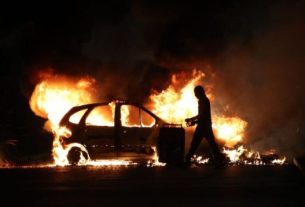But the result puts France in uncharted territory as it’s never experienced a parliament with no dominant party. What happens next largely depends on the deeply unpopular president, Emmanuel Macron.
A coalition of the French left has won the most seats in the second round of high-stakes legislative elections, beating back the far-right surge but failing to win an outright majority.
According to the final results, the left-wing New Popular Front alliance, formed just three weeks ago, has won 182 seats.
289 seats are needed for a majority in the 577-seat National Assembly.
President Emmanuel Macron’s centrist Ensemble (Together) coalition came in second with 168 while the far-right National Rally, widely tipped to win after coming out on top in the first round, finished with 143 seats.
After the first results were published shortly after polls closed, National Rally president Jordan Bardella slammed what he called “the alliance of dishonour” and said they were throwing France to the extreme left.
“Denying millions of French people the chance to see their ideas brought to power will never be a viable destiny for France. Tonight, by deliberately taking it upon himself to paralyse our institutions, Emmanuel Macron has pushed the country towards uncertainty and instability,” he told supporters in Paris.
National Rally party leader Marine Le Pen, who intends to run in the 2027 presidential race, said the results meant France would be “deadlocked”.
“It’s unfortunate, we will lose another year, another year of illegal immigration, another year of purchasing power loss, another year of insecurity exploding in our country. But if that’s what it takes, well, then that’s what it takes,” she said.
Leader of France Unbowed, the largest party in the winning coalition, Jean-Luc Mélenchon said the result was a clear rejection of the unpopular Emmanuel Macron and that the president should call on the New Popular Front to govern.
“The President must bow and accept this defeat without attempting to circumvent it in any way whatsoever. The Prime Minister must go. He has never received the confidence of the National Assembly. He has just managed the campaign lost by his camp, and he has received a massive popular vote of no confidence,” he said.
Prime Minister Gabriel Attal said on Sunday night that he would tender his resignation to Macron on Monday morning, saying “Tonight, a new era begins.”
What happens now?
This is uncharted territory for modern France which has never experienced a parliament with no dominant party.
The weakened Macron could seek a deal with the moderate left to create a joint government, but France has no tradition of this kind of arrangement. A deal could take the form of a loose, informal alliance that would likely be fragile.
And already, leaders of the New Popular Front are pushing Macron to give their alliance the first chance to form a government and propose a prime minister to share power with him.
If he can’t make a deal, Macron could name a government of experts unaffiliated with political parties to handle the day-to-day work of keeping one of Europe’s largest countries running. But that would require parliamentary approval. And the first session with new members of National Assembly is July 18.
Meanwhile, no clear figure has emerged as a possible prime minister. Macron’s office has said he would wait for the new National Assembly to take shape before taking “the necessary decisions.”__Courtesy EuroNews





